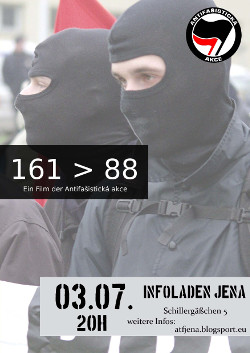
161>88 (2012)
Director: Antifascist Action (AFA)
Runtime: 94 min
The rise of the extreme right in Czech Republic after 1989, as well as the birth of a new anti-fascist movement, and more than 20 years of struggle against neo-Nazis that followed, is very well documented in this activist and anti-fascist film.
Transition in Czechoslovakia began after the Velvet Revolution of 1989 when the ruling state socialist regime was overthrown by a popular upheaval. At that point it was necessary to neutralize the working class, both politically and ideologically, so that it wouldn’t be able to effectively oppose the erosion of social rights and privatization of economy that ensued in the Czech Republic, like everywhere else in the countries of the former Eastern Bloc. The crucial role in preventing working class from independent political organizing belonged to entire specter of ideologies which could be jointly labelled as anti-communism, whose essence was to declare impossible, abnormal and unnatural for the majority of people to control means of production and the products of their labor. Important place in this process had ideas of elitism and social-Darwinism, racism and auto-racism, which are a part of the corpus of reactionary ideologies. In this way, the birth of a new extreme right was integral part of transition from socialism toward liberal capitalism, and the ideological justification of the transition was unthinkable without the participation of the extreme right.
In the center of neo-Nazi and far-right agenda was relentless propaganda and aggressive campaign against Romani people, who make up 2-3% of Czech population. During 1990/91 an explicitly anti-Romani song from a popular neo-Nazi punk-rock bend Orlík became one of the most popular songs in Czech Republic, which contributed to rapid growth of nazi skinhead subculture. Nazi skinheads terrorized and beat people up on a daily basis, frequently with very serious consequences, including beatings with a fatal outcome.
At that time the right-wing populist “Republican Party” gained support thanks to its radical rhetoric against corruption, immigrants and the so-called “Gypsy crime”. Large number of neo-Nazis joined this parliamentary party, which was headed in an autocratic manner by the politician Miroslav Sladek. At its peak in 1996, The Republican Party gained 8% of the votes on the parliamentary election, and soon collapsed due to numerous scandals and financial machinations of its leadership. Afterwards, other groups and organizations of similar type emerged, including the political party “Dělnická strana” and neo-Nazi organization “Národní odpor”, which organized numerous anti-gypsy marches and protests.
The antifascists’ response, among whom Czech anarchists had the leading role, were public demonstrations and manifestations. Soon it became evident that the police and the State Security Services were not only sympathetic and protective of the fascists, but also were ready to cooperate with them. Consequently, there were many riots and street clashes between antifascists and anarchists on one side, and neo-Nazis and the police on the other.
In this process an organization was born. Antifascist Action emerged as combative wing of the anti-fascist movement. AFA physically protected anti-fascist gatherings, making public manifestations of anti-fascism possible, even when Nazis were regularly killing people in the streets, while police protected them and persecuted anti-fascists. Hence the cryptic title of the film “161>88”. Number 88 is the Nazi Skinhead code for “Heil Hitler”, since “H” is the 8th letter of the alphabet, and as an answer the Anti-Fascist Action promotes its own code “161” which represents letters “AFA”. The title of this activist documentary sends message that Antifascist Action is stronger than neo-Nazis.
The end of the movie is far from optimistic, since we are able to see how, quickly after the beginning of the economic crisis, liberal politicians and social democratic government enacted something that the neo-Nazis could not have done in 20 years – they lead a racist campaign in mass media representing Roma people as one of the biggest problems of Czech society, and then enabled the subtraction of welfare and segregation of Romani children in the education system. After the government normalized neo-Nazi rhetorics in this way, “common” people were encouraged to raise their voice against “racial mixing” and “Gypsy crime”, and they started coming to anti-Gypsy protests organized by the skinheads.
Eventually it becomes crystal clear that the system we live in generates and maintains racism, and that in times of crisis or social turmoil the system encourages and uses racism for redirecting discontent of the majority towards Roma people or some other “others” who are convenient for the role of a scapegoat. Politicians and economic élite skillfully use racism to protect themselves and to prevent the turning of popular focus towards real social and political problems.
In 2014 again a neo-Nazi band called “Ortel” became one of the top 10 music groups in the Czech Republic.
You can buy this film online or download it for free.

